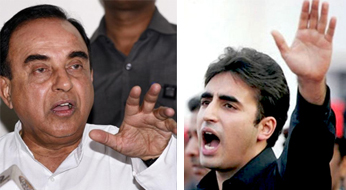New Delhi, Sep 21: Bharatiya Janata Party (BJP) leader Subramanian Swamy on Saturday claimed that India is capable of destroying Pakistan but does not want a war. He also termed Bilawal Bhutto Zardari's statement on Kashmir as 'immature'.
 “India is capable of finishing off Pakistan but we do not want a war,” Swamy said on Bilawal Bhutto's statement on Kashmir.
“India is capable of finishing off Pakistan but we do not want a war,” Swamy said on Bilawal Bhutto's statement on Kashmir.
Swamy's reaction came soon after Bilawal, the head of secular Pakistan People's Party (PPP), which officially wants good ties with India, gave a controversial statement on India, saying 'he will take back all of Kashmir from India'
“I will not leave behind a single inch because Kashmir belongs to Pakistan,” Bilawal had said while addressing the party workers in Multan region in Punjab yesterday.
Further slamming PPP leader Bilawal Bhutto, Swammy termed his statement as highly 'irresponsible and immature'.
“The English word for this is "immature", he has no experience in politics,” Swamy told reporters here.
When asked about Bilawal Bhutto's statement on Kashmir, Swamy reiterated that Kashmir will always remain an integral part of India, and Pakistan can never take it from India.
“Kashmir is an integral part of India,” Swamy said, ANI reported.
Bilawal's controversial statement statement on Kashmir came four days after the scion of highly influential Bhutto family announced to contest the 2018 Pak General Elections from his mother's home constituency (NA-207).
According to an English daily, Bilawal plans to overhaul his Pakistan People’s Party (PPP) which suffered a humiliating defeat last year.
“My aim is to have a PPP victory in the 2018 election. It’s five years from now, and that’s an extremely long time in politics. It’s a lifetime,” he had said.
The National Assembly constituency from where Bilawal plans to contest the polls is viewed as "The fort of the PPP" as the seat covers the native home of former prime ministers Benazir Bhutto and Zulfiqar Ali Bhutto.
The seat was won by Faryal Talpur of the PPP in the 2013 General Elections. He earlier won this seat uncontested in 2008.
Benazir Bhutto was elected twice as the prime minister of Pakistan. She was killed in a gun and suicide attack after an election rally in Rawalpindi on December 27, 2007. No one has yet been convicted of her murder.
Also Read: Kashmir belongs to Pakistan, will take back every inch of it: Bilawal Bhutto





Comments
Add new comment